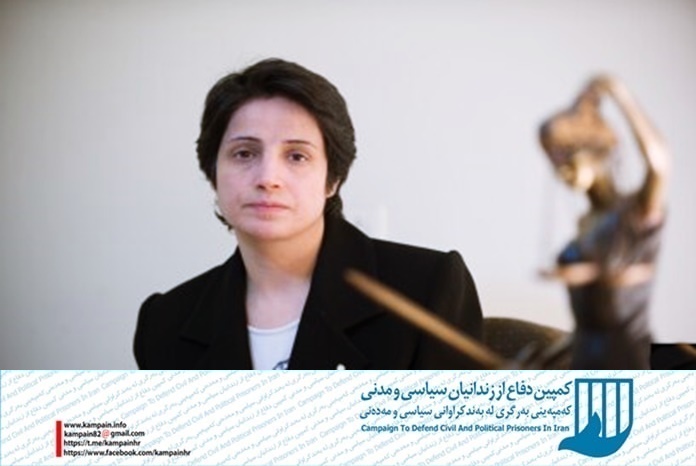According to the Campaign for the Defense of Political and Civil Prisoners, Nasrin Sotoudeh, a lawyer and human rights activist, who was arrested at Armita Geravand’s funeral and is now imprisoned in Qarchak Prison, published a letter from prison explaining how she and her companions were arrested and how they stood up to security forces.
She wrote:
It is Monday morning; we have arrived at Evin courthouse around 10 AM. We are sitting in the courthouse’s yard. Some of them are without hijab, some are smoking, and piercings in one of their earlobes, which fill the earlobe from top to bottom. One has a piercing in her nose and the another is wearing a beautiful short coat with a velvet army green color, which unconsciously draws eyes to her legs with her short black pants and her slender and beautiful body. She has beautiful curly hair that fills her whole head, and its bright brown color becomes brighter and more beautiful under the pale light of the autumn sun.
There were 43 of us that day, 23 women on one side of the yard and about 20 men on the other side of the yard. We were all arrested the day before. Most of us were arrested at the funeral and at the graveside. Two or three people were also arrested during the mosque ceremony. Most of those who were arrested in the mosque that evening, were released by midnight. Among them, two or three people were not willing to accept bail and pledge. What commitment? A commitment not to participate in such events again.
Among those arrested, there was one who was wearing an official uniform and mask and was with us in the van. She said she hated herself for wearing this dress every day to work, but now it’s easier.
When I reached Behesht Zahra, I went to the wash room. Armita’s relatives were standing. A little later, her mother and sister also arrived. People would come forward and introduce themselves, and we would go along. Among those who came forward and greeted us, was Manzar Pourzarabi with a picture of her children. Since she and I went together and went to the grave in her car, she had the photo of her children in her hand. The officers grabbed the photos from behind and she ran to them and took them back. After returning, she folded the picture and put it in her bag. Suddenly, I saw a young girl who was dragged. I dragged her back and others also dragged her into the crowd and pushed her a few rows ahead. They put a scarf on her head and the necessary preparations for concealment…
Moments later, they dragged the Manzar, I went to drag her back, they dragged both of us to the ground and took us away. When we got into the van, they had arrested some people before us and the van was almost full. I sat at the door. The officer kept telling me to go further into the van. I was sitting and not going. He shocks me few times in my leg, but I didn’t move. The reason was the tearful eyes of a woman who was waiting for arrest in front of the van and the officers had no room. Later, one of my friends said from one of her phone calls, that my friend sent a message to my family to thank Mrs. Sotoudeh for me as she was sitting in front of the door, there was no place for them to arrest me and they released me. We were taken from Behesht Zahra to the Vozara detention center.
The wind blows in our hair more carelessly than the youth of children. I and Mrs. Manzar, 60 and 65 years old, refused to wear headscarves. After a while, the younger ones would slowly put on a scarf for a few minutes before going to the interrogation and coming back from it, so that they might be released. The men of the prosecutor’s office had left their work and were coming and going one by one and looking at us with wide eyes. We had done the most normal thing in the world. We were sitting there carelessly, but the breath of the gentlemen in the prosecutor’s office was locked in their chests. They looked and said, what is this situation?
Once an hour, they would tie Manzar’s and mine’s hands together and ordered to take us back to the Vozara detention center, and after half an hour, they would take us out of the van again and tell us to put on your headscarves and go to the interrogation. We did not obey and did not leave. They did it twice. In one of these scenarios, when they were taking us to the van, I told the agent to tell Mr. Ghanaatkar that I will definitely file a complaint against him, because he cannot stop me from participating in the trial because I don’t have a headscarf. I, who had not been willing to participate in any court for years, now insisted on appearing in Evin’s courtroom without a hijab in the middle of this great sadness, the sadness of losing Armita. We, a number of defendants, had been feminizing the Evin’s courtyard for hours, without realizing it. We had jeopardized the entire manhood and security with our hair.


